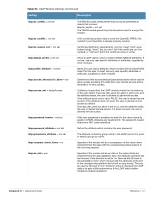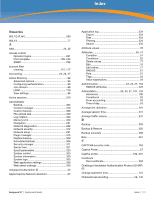Dell PowerConnect W Clearpass 100 Software 3.7 Deployment Guide - Page 424
Idle-Timeout, Session-Timeout
 |
View all Dell PowerConnect W Clearpass 100 Software manuals
Add to My Manuals
Save this manual to your list of manuals |
Page 424 highlights
Framed-IP-Address: This attribute indicates the address to be configured for the user. In an Accounting-Request packet, it indicates the IP address of the user. Framed-IP-Netmask: This attribute indicates the IP netmask to be configured for the user when the user is a router to a network. Framed-Routing: This attribute indicates the routing method for the user, when the user is a router to a network. It is only used in Access-Accept packets. Framed-MTU: This attribute indicates the Maximum Transmission Unit to be configured for the user, when it is not negotiated by some other means (such as PPP). It is only used in Access-Accept packets. Framed-Compression: This attribute indicates a compression protocol to be used for the link. Reply-Message: This attribute indicates text which may be displayed to the user. Callback-Number: This attribute indicates a dialing string to be used for callback. Callback-Id: This attribute indicates the name of a place to be called, to be interpreted by the NAS. Framed-Route: This attribute provides routing information to be configured for the user on the NAS. It is used in the Access-Accept packet and can appear multiple times. State: This attribute is available to be sent by the server to the client in an Access-Challenge and MUST be sent unmodified from the client to the server in the new Access-Request reply to that challenge, if any. Class: This attribute is available to be sent by the server to the client in an Access-Accept and should be sent unmodified by the client to the accounting server as part of the Accounting-Request packet if accounting is supported. Vendor-Specific: This attribute is available to allow vendors to support their own extended Attributes not suitable for general usage. Session-Timeout: This attribute sets the maximum number of seconds of service to be provided to the user before termination of the session or prompt. Idle-Timeout: This attribute indicates how many octets have been received from the port over the course of this service being provided, and can only be present in Accounting-Request records where the Acct-Status-Type is set to Stop. Acct-Output-Octets: This attribute indicates how many octets have been sent to the port in the course of delivering this service, and can only be present in interim and stop Accounting-Request records. Acct-Session-Id: This attribute is a unique Accounting ID to make it easy to match start and stop records in a log file. Acct-Authentic: This attribute may be included in an Accounting-Request to indicate how the user was authenticated, whether by RADIUS, the NAS itself, or another remote authentication protocol. Users who are delivered service without being authenticated should not generate Accounting records. Acct-Session-Time: This attribute indicates how many seconds the user has received service for, and can only be present in Accounting-Request records where the Acct-Status-Type is set to Stop or Interim Update. Acct-Input-Packets: This attribute indicates how many packets have been received from the port over the course of this service being provided to a Framed User, and can only be present in AccountingRequest records where the Acct-Status-Type is set to Stop or Interim Update. This attribute indicates how many packets have been sent to the port in the course of delivering this service to a Framed User, and can only be present in Accounting-Request records where the Acct-Status-Type is set to Stop or Interim Update. Acct-Terminate-Cause: This attribute indicates how the session was terminated, and can only be present in Accounting-Request records where the Acct- Status-Type is set to Stop. 424 | Reference Amigopod 3.7 | Deployment Guide















